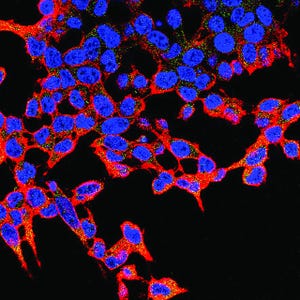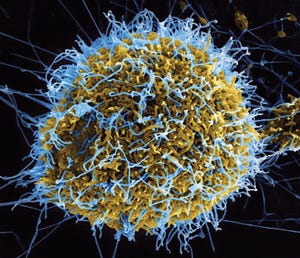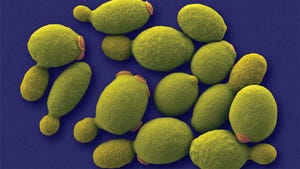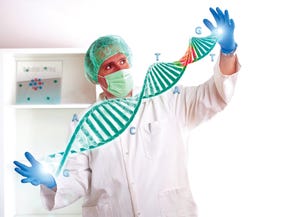May 2021 Featured Report
HEK 293T cells (ATCC CRL-3216) can express SARS-CoV-2 spike proteins; biomanufacturers of viruses and other vaccine components often think outside the box when it comes to considering expression systems. (
https://www.atcc.org
)
Plato wrote in ancient Greece that “our need will be the real creator,” which transformed over time into the English proverb, “Necessity is the mother of invention.” Advancements in medicine and biomanufacturing technology in 2020 have epitomized that idea. Even as technologies such as mRNA vaccines have rocketed into the public’s awareness, biomanufacturing experts have worked behind the scenes with renewed vigor spurred on by hard lessons from the pandemic.
Cell-line development and engineering are no exception. Already undergoing a revolution in speed and bioengineering capabilities, the discipline of biological expression has broadened its attention to assess options that previously were considered “for research purposes only” as real candidates for bioprocessing. New approach...
Digitally colorized scanning electron microscopic image of Ebola virus particles (blue) budding from an infected Vero E6 cell (
https://www.atcc.org
)
Fang Tian is a lead scientist and head of cell biology research and development at the American Type Culture Collection (ATCC) in Manassas, VA. She is a member of both the International Cell Line Authentication Committee (ICLAC) and the US technical advisory group for the ISO/TC276 technical committee. At ATCC, she oversees preparation, authentication, characterization, quality control, and cryopreservation of more than 3,400 accessioned animal cell lines and hybridomas in the cell biology general collection. She holds a PhD in pharmacology from the Chinese Academy of Science and served a four-year postdoctoral fellowship at the University of Pittsburgh. There, she worked on an anti-cancer cytokine and established a culture method for endothelial progenitor cell differentiation from mouse bone-marrow–derived hematopoietic stem cells. Later, in a two-year re...
Pichia pastoris
yeast cells (
https://en.wikipedia.org
)
Major biopharmaceutical companies are teaming up with academics and the Bill & Melinda Gates Foundation to develop new biomanufacturing cell lines and methods. The project — known as the
AltHost Consortium
— is exploring innovative ways to produce biologics and vaccines for clinical usage in diseases from diabetes to cancer.
Lead researcher J. Christopher Love at the Massachusetts Institute of Technology (MIT) likens this precompetitive, open-access collaboration to the early days of the biopharmaceutical industry. “When biomanufacturing first emerged as a field, shared knowledge across laboratories was crucial for the development of new technologies, and everyone had a stake in the conversation. We are returning to that collaborative, innovative spirit we once shared, and we aim to enable new manufacturing solutions that offer both speed and volume.”
The biopharmaceutical industry relies heavily on Chinese hamster ovary (CHO) cells to produce bi...
Bioprocess engineer Beatrice Melinek is a postdoctoral research fellow at University College London’s
Future Targeted Healthcare Manufacturing (FTHM) Hub
, where she focuses on the use of cell-free protein synthesis (CFPS) as a platform for distributed production of stratified biotherapeutics. Previously Melinek specialized in purification of viral vectors and vaccines, with an engineering doctorate (EngD) in biochemical engineering and postdoctoral experience in UCL’s hematology department developing a new chromatography-based analytical method for measuring empty and full adenoassociated virus (AAV) capsids. She also worked on modifications to a polio vaccine production process at Univercells Technologies. Before that, she spent six years on a dynamic process simulations team for the Atkins Global engineering and design firm before returning to academia.
Melinek holds two master’s degrees: one in chemical engineering from Imperial College London, and the other in biochemical engineering from UCL. Last ...
Pierre-Alain Girod is chief scientific officer (CSO) for Selexis SA. He holds a PhD in plant biochemistry from the University of Lausanne in Switzerland and completed a postdoctoral fellowship at the University of Wisconsin in Madison, WI, on the degradation of proteins by the ubiquitin pathway. Girod returned to Switzerland in 1993, where he discovered a family of sequences that are involved in the epigenetic regulation of genes. That discovery subsequently has been used to express therapeutic proteins in the biopharmaceutical industry. Girod has been CSO at Selexis since 2006. We chatted in March 2021 about his company’s work with Chinese hamster ovary (CHO) cells and other expression systems.
Our Conversation
Cell-line engineering has advanced dramatically over the past decade, with new promoters and instrumentation transforming workflows. What have been your experiences/successes in this area?
The pipeline of clinical candidates developed with our technologies has advanced rapidly over the past decad...
Subscribe to receive our monthly print or digital publication
Join our 70,000+ readers. And yes, it's completely free.










